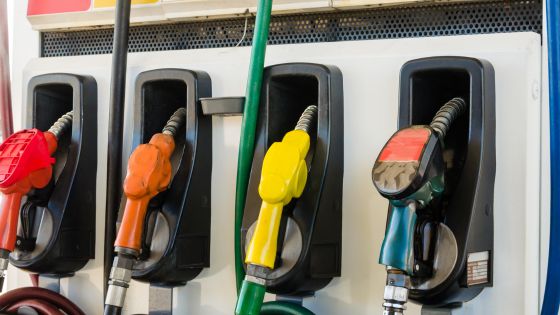Choosing the right fuel type for your vehicle is more important today than ever before, with a variety of options available beyond traditional gasoline. Each type of fuel has its benefits and limitations and the best choice depends on your driving habits, environmental priorities and economic considerations.

Gasoline
Gasoline remains the most common fuel type for vehicles worldwide. It’s widely available and offers a relatively high energy density, meaning gasoline-powered cars generally provide good range and power. For the average driver who requires convenience and accessibility, gasoline is often the easiest choice.
Pros:
- Widely available
- High energy density
- Typically lower upfront vehicle costs compared to alternative fuels
Cons:
- Produces more emissions than some alternatives
- Fluctuating prices
Diesel
Diesel engines are known for their efficiency and torque, making them ideal if you are looking at a truck, like a Ford or a new GMC for sale. Diesel fuel contains more energy per liter than gasoline, which can translate into better fuel economy and longer driving ranges for heavy-duty vehicles.
Pros:
- Higher fuel efficiency
- More torque for towing and hauling
- Longevity and durability of diesel engines
Cons:
- Higher levels of certain pollutants
- Generally more expensive upfront costs for diesel vehicles
- Less availability than gasoline
Hybrid
Hybrid vehicles combine a gasoline engine with one or more electric motors. They are a popular choice for those looking to reduce their fuel consumption and emissions but who are not ready to switch to a fully electric vehicle.
Pros:
- Reduced fuel consumption and emissions
- Less dependent on charging infrastructure than fully electric vehicles
- Potential tax incentives and rebates
Cons:
- Higher initial purchase price
- Potential for expensive battery replacements
- Usually less power than conventional gasoline vehicles
Electric
Electric vehicles run on electricity alone, which is stored in rechargeable batteries. They are an excellent option for environmentally conscious drivers and those with access to home or public charging stations.
Pros:
- Zero emissions
- Lower operating costs (electricity is cheaper than gasoline or diesel)
- High torque and smooth acceleration
Cons:
- Requires access to charging stations
- Limited range compared to gasoline vehicles
- Higher upfront costs, though decreasing
Ethanol and Flex-Fuel
Ethanol is a form of alcohol that can be mixed with gasoline to power vehicles. Most modern vehicles can run on a blend containing up to 10% ethanol, and flex-fuel vehicles can use up to 85% ethanol.
Pros:
- Can reduce dependence on petroleum
- May reduce greenhouse gas emissions
- Usually cheaper per gallon than pure gasoline
Cons:
- Lower energy content than pure gasoline, which can reduce mileage
- Not all vehicles can use higher ethanol blends
- Limited availability in some areas
Considerations for Choosing the Best Fuel Type
- Driving Habits: Consider how much and how often you drive. Electric vehicles might be ideal for city driving and shorter commutes, while long-distance drivers might prefer diesel or gasoline.
- Environmental Impact: If reducing your carbon footprint is a priority, consider electric or hybrid vehicles.
- Cost Effectiveness: Factor in the cost of the fuel and the total cost of ownership, including vehicle price, maintenance and potential tax incentives.
- Fuel Availability: Make sure the type of fuel your vehicle requires is readily available in your area. This is especially important for electric vehicle owners who need access to charging stations.
Options that Fit Your Lifestyle
Choosing the right fuel type for your vehicle involves weighing factors including environmental impact, cost, convenience and driving needs. As the automotive industry evolves, the options for more sustainable and efficient driving continue to expand, giving consumers a greater ability to choose a vehicle that best aligns with their lifestyle and values.
